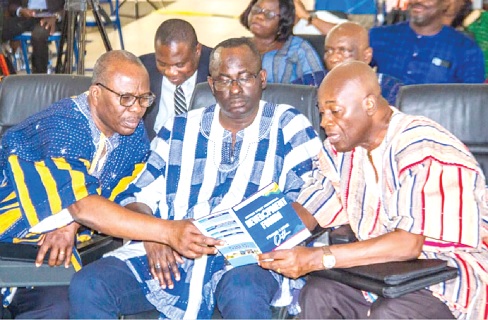
Global thinking, local action must blend to spread development - Dan Botwe advocates
The Minister of Local Government, Decentralisation and Rural Development, Dan Botwe, has stressed the need to link global thinking with local actions in order to extend the benefits of development to every household and community.
Highlighting the significance of the Gulf of Guinea Northern Regions Social Cohesion (SoCo) projects at the Upper West Regional Development Forum in Wa last Thursday, Mr Botwe said the projects embraced key tenets of local governance and decentralisation.
Those, he said, comprised fiscal decentralisation, popular participation, decentralised planning and local economic development, stressing that they were inter-connected strategies meant not to only champion development, but also to gain trust among communities to reduce their exposure to conflict and violence.
The development forum was organised by the National Development Planning Commission (NDPC), in collaboration with the Ministry of Local Government, Rural Development and Decentralisation.
The first edition was held in Tamale on August 15 last year to discuss issues pertaining to the development of the northern part of Ghana.
Mr Botwe said it was a user forum on the knowledge management platform which had been developed to catalogue investments that would be mapped spatially and to host research and relevant knowledge materials for the use of various categories of stakeholders.
He said the initiatives were significant steps towards a more coordinated, participatory and well-informed approach to development, and that it was expected to also culminate in efficient tracking of interventions in the northern part of Ghana.
Mr Botwe said it was also to ascertain the impact those interventions was making on the lives of citizens.
The minister said the northern part of Ghana had received significant development interventions, especially through the activities of various non-governmental organisations, in the areas of health, education, infrastructure and local economic growth.
Mr Botwe said even though those interventions were targeted to address specific developmental challenges, the overall impact could have been more than what existed currently.
He acknowledged that the major challenge had been that the interventions were mostly fragmented and uncoordinated, and urged all to work hard to fully achieve the developmental vision for northern Ghana.
Scoping report
Mr Botwe explained that the scoping report, which was presented at the forum to shed light on the distinctive challenges and opportunities that the people in the northern part of Ghana faced, was to illustrate how targeted, informed and collaborative development efforts had been over the years.
He said the report also explored opportunities that could lead to substantial improvements in the lives of citizens.
He said it advocated a united, community-based approach that would make the SoCo project and many others become a catalyst for change and ensure that development efforts were not only top-down but also rooted in the people's daily needs and aspirations.
The study, Mr Botwe said, was expected to be instrumental in finding the challenges and to unlock potential areas for scaling up the SoCo project, as well as areas of collaboration, especially among development partners.
The Upper West Regional Minister, Dr Hafiz Bin Salih, observed that the SoCo Project had become a game-changer in the development agenda of the region.
He said districts and community capacity-building teams had been trained to assist in the implementation of the project and urged the people to support its successful implementation.
In spite of the above interventions, Dr Bin Salih said, there were still challenges that affected performance at the district assembly level such as reporting timelines, data gathering and storage.
He, therefore, urged the metropolitan, municipal and district assemblies to accept and operationalise the Digital Management Platform.
He said his office would continue to monitor assemblies in the implementation of programmes and projects and hold them responsible when they failed to live up to expectation.
Climate change
A Vice-Chairman of the NDPC, David Quaye Annang, who chaired the forum, said the SoCo projects were expected to address challenges imposed by spillovers from potential conflicts and extremism from the Sahel region.
He said it was to reduce vulnerability due to exposure to the impact of climate change, strengthen local institutions, improve economic opportunities, as well as build public trust.
Mr Annang said the natural environment in the Guinea-Savannah posed harsh climatic conditions in the form of the single rainy season and prolonged dry spell, which led to severe drought.
These notwithstanding, he said, efforts had been made in the past by governments, development partners and NGOs, but the impact of these interventions had been hindered by a lack of coordination and a fragmented approach towards the implementation of programmes.
He said the overall goal of the forum was to promote evidence-based decision-making for integrated and inclusive development of northern Ghana.
